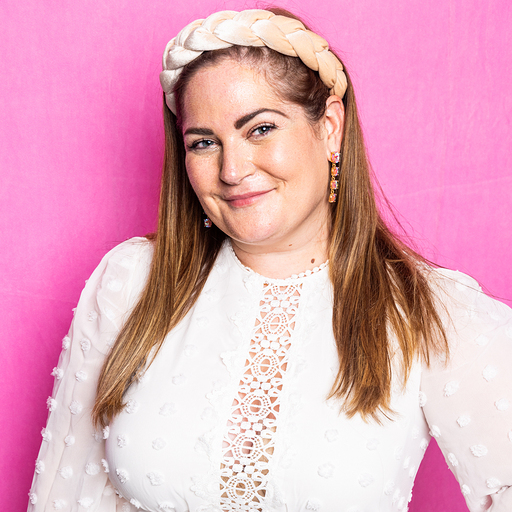[00:00:00] Jessy Grossman: A manager’s not going to just suggest talent for you to work with and expect nothing in return. I mean, I wouldn’t, let me just be clear. I wouldn’t because that’s how I make my money. That’s how I would make income. So for me to just give it away to you for free, like sure, maybe there’s like a bigger picture goal there, which is like building the relationship, but I also don’t want you to think that you can always come to me for free things.
[00:00:33] Whoop, what an interesting week it’s been. Hi guys. Hello. Welcome back to the podcast. I’m excited to be here and excited for you guys. If anyone is new, then huge welcome to you. We had quite the spicy topic. In our stock this week. And so while I obviously respect everyone’s privacy, and I’m certainly not going to share names and details of what was shared, I am going to dive into the topic itself because I do think it’s like fascinating.
[00:01:03] It’s certainly not new, but it’s like, never really been broadly addressed. And I think that it’s going to be a pretty interesting one to get into. So the topic that we’re diving in today very specifically. It’s about managers who pitch non exclusive talent. There’s certainly been some, like, shady dealings that we’ve even covered on this podcast about, I don’t know, a year plus ago and certainly even since.
[00:01:29] Carter Agency scandal and just other talent management companies who Sort of seem to be operating in this gray area of shadiness. I like to call it where it just feels predatory. However, there are other managers who are just hustling and just trying to pitch people who maybe they want to establish an exclusive relationship with, and they have to build to that point.
[00:01:55] They’re trying to bring opportunities to them. And this always seems to rub brands or agencies the wrong way. So we’re going to talk about it. The nuances I think are important. So let’s get into it.
[00:02:11] This show is sponsored by Women in Influencer Marketing, better known as WHIM, the best online community for the creator economy. You will meet fellow influencer marketers. You’ll meet brands, you’ll meet talent agencies to talk shop, get hired, and even find a mentor. When you become a member, do not forget to check out all of our incredible resources.
[00:02:35] For example, we have dozens of masterclasses from the top voices of TikTok, YouTube, award winning agencies, and women who are paving the way for us all. So if you want the chance to network with a free student in films and marketing, check out what it takes to become a member. Make more money and have fun doing it.
[00:02:56] Visit IamWim. com That’s I A M W I I M dot com slash join today. And I so look forward to seeing you more around the community. All right, guys. So this is such a hot topic. It’s so nuanced, but also very niche. So, but I think that a lot of people have experienced it and kind of like express their Just pleasure, like behind the scenes, but no one’s really publicly sort of made a stink about it.
[00:03:29] Maybe in a whim a little bit, but they’ve certainly made a stink about it to me. I’ve gotten a couple messages about actually the same person in a whim who, chare name their main nameless of course, but that this manager pitched some talent to our two different members who are on the brand side. And it was like they didn’t represent the talent exclusively, one of them went way further than the other one did in that it definitely seems nefarious and definitely felt just like duplicitous, for sure.
[00:04:02] And then the other one just sort of rubbed her the wrong way. And to be honest, like, I’m kind of glad that her instincts, her spidey sense was going off because It probably prevented a much larger issue. And I’m trying to figure out how to address this with our member because here is the issue. All right.
[00:04:22] Is this like explicitly wrong to do pitching talent that you don’t exclusively represent fundamentally? Inherently? No, it’s not wrong. This is just my opinion, but like I’ve done it. Some of the reasons before are that I mentioned before are why I did it, right? Like maybe there’s a creator that. You know, I met once or twice, but like, I’m trying to earn their business.
[00:04:46] And so, no, we don’t represent them exclusively yet, but like, I’d love to. And how do you do that? You pitch them for things and you get them business and they’re like, Oh dang, like she is really a producer and she might be great to have on my team. And you earn that trust. So I’ve done it, but I will say this is what I’ve sort of discovered because I’ve asked, I’ve had in depth conversations after both of those scenarios came up with the folks at whim on the brand side.
[00:05:14] And I asked them, I was like, I want to get to the root of like, what went awry here? Because there’s a right way to do this in my opinion. And then there’s like a sketchy way to do it in my opinion. And I think here’s what we came up with. There’s definitely a wrong way to do it. The wrong way to do it is by just saying, here’s this talent that I represent or my talent or however you want to say it and provide zero context whatsoever when the truth is that you’ve literally never been in contact with that creator before.
[00:05:48] That you can’t do like you shouldn’t do because what happened in the in one of the instances is this manager pitched into a creator and the creator was already speaking with the brand and had no like mentioned nothing about having a manager and in fact when they checked in to say hey like Do you have a manager?
[00:06:11] They explicitly said, no, that’s why we’re working together. So it just felt as if it was like a cash grab, right? Like it felt as if they’re trying to insert themselves in a place where they had no right to be. And it felt like, and by doing so, and literally having had no interaction with that creator, the creator had no idea who this manager was.
[00:06:32] But they were being presented to the brand as if there were some sort of relationship there. Yeah, that feels sketchy. Like that’s the bright line test that doesn’t feel appropriate. But I sort of played devil’s advocate with one of my friends in WIM and I asked the following question. I was like, if they had approached you differently and said, Here are three creators I think would be fantastic for this campaign that you’re casting.
[00:06:58] The first one is one that I represent exclusively. The second one is someone that I freelance with. And then the third is someone that I just happen to think is a great fit for your campaign and I don’t think they’re represented. So it’d be awesome if you work with them. If you could go through me, I’m trying to earn their business.
[00:07:17] And I asked her, I was like, if it was presented that transparently, would that have made a difference for you? And she said, yes, she said, absolutely. Because to her, what really was the rub is the lack of transparency. And like, she’s like, my spidey sense was just telling me that this was like, just nefarious and like, It felt scammy and I agree with her.
[00:07:41] And I think in this instance, it kind of was like it was predatory, at least at the very least, there was just no relationship there whatsoever. And so with that, with this manager, there’s a complete possibility that she could just not know the right way to sell this, right? If she had just said what I did, which is something along the lines of, Here are three creators that I think would be great for you.
[00:08:12] I don’t have a relationship with them, but I think they would be fantastic. And I did a little research and digging because casting is like such a forte of mine, a passion of mine. If you end up working with them, would you mind going through me? Because I’d love to represent them and forge a relationship together.
[00:08:27] And I think that just would have gone such a longer way. And here’s the thing though, I’ve heard some brand folks be like, I don’t give a shit if that’s what I hear. Like, no, like, Oh, they’re not yours to take a cut of. And that feels like a little slimy and whatever. And if that’s your opinion, that’s your opinion.
[00:08:43] That’s fine. But it saves a lot of back and forth to sort of get to the root of like, that’s what’s going on so that you can come to that conclusion. Right. But alternatively, some, you know, brands would say, I appreciate the candor and Like, sure, I appreciate the help because here’s the thing that I was trying to make the point of to my friend is like, okay, so if you’re really struggling to like find the perfect creator for the super niche, really challenging to cast campaign and that manager brings you like the perfect freaking person.
[00:09:17] Isn’t there a value to that? Like, don’t they deserve a finder’s fee of sorts? Like call it what you want, call it a commission or a finder’s fee or whatever it is, but like, didn’t they do some valuable, helpful work for you? And she couldn’t help but say like, I mean, if that’s truly how it went down, then like, yeah, I can see that.
[00:09:37] Like, yes, absolutely. So I think like, again, these nuances matter and sort of like being transparent The work that you’re doing and your intentions and what have you, I think are really important. But here’s the other thing that I kept hearing in our slack conversation about this that I just fundamentally disagree with.
[00:09:54] And if you’re on the agency or brands, I’d like, please hear me out. There were countless people who were saying, I recommend talent all the time that like, you know, I just love suggesting talent that I’ve come across that might be perfect for somebody else’s campaign. And I don’t expect anything from it.
[00:10:11] Like maybe they should do that more. You guys, where does your paycheck come from? It comes from the brand or the agency that pays you regularly, regardless of any sort of selling that you’re doing. Where does a manager’s paycheck come from? It comes directly from these recommendations. That’s the entire fundamental.
[00:10:30] like component of their business. It’s literally asking them to work for free. Why would they ever do that? That just doesn’t make any sense. So for all those people, there were a significant amount of them. I love you. And I think that you’re wonderful. I think that this perspective hopefully will help you understand on managers, not going to just.
[00:10:50] Suggest talent for you to work with and expect nothing in return. I mean, I wouldn’t, let me just be clear. I wouldn’t because that’s how I make my money. That’s how I would make income. So for me to just give it away to you for free, like sure, maybe there’s like a bigger picture goal there, which is like building the relationship.
[00:11:11] But I also don’t want you to think that you can always come to me for free things. So Just the business side of my brain, I would never do that personally. And I certainly wouldn’t like be like, you know, more managers should just like, why do they always expect something in return? And it’s like, what are you talking about?
[00:11:26] That’s like literally their job. Like that’s how they make money. They’re not being paid any other way. So like, it’s not this. I don’t know. Just, I think that perspective is really important to know. Quick question for you guys. How much do you love redlining agreements? Yeah, me too. Let me tell you about our latest sponsor called Caveat.
[00:11:48] So Caveat with a K is an AI powered contracting platform that simplifies and optimizes your Automates your contracts. It’ll hugely improve the way that you review partnership agreements. So if you’re a media company or an entertainment company or a management firm, it’s a must have tool. Look, sometimes you do need to hire a lawyer, an expensive lawyer nonetheless, to work on an agreement because it’s over a certain threshold and a good lawyer can be invaluable.
[00:12:21] But what about all those other partnerships, those other contracts that are for hire? Like a thousand dollars. That’s where Caveat comes in to support you and your team through AI to process your contract, to gain a competitive edge through data driven insights and automatic AI driven red lines. It’s game changing tech, and it’s founded by three brilliant women, so you know why I’m out here supporting it.
[00:12:50] Get time back in your day because caveat will help you with the part of your business that may be your least favorite. So head to our website, it’s I am whim. com slash caveat for a completely free trial. That’s I a m w i i m. com slash k a v e a t. I hope you guys love it as much as I do. And then lastly, what I wanted to just touch on this topic.
[00:13:16] Was the idea of brokers. So they’re like a handful of people who have historically acted as this like third party in between. I’m not a manager. I don’t work on the brand side. I’m like a relationship person. I’m a broker. And so I connect all of you guys and I have relationships with everybody and it’s all on me up and up, but that’s what my role is.
[00:13:43] I’m all for it, you guys. I’m all I think that we, generally speaking, are too limited in the roles that we play within the creator economy and the structure of commission that we take and just the way that we all operate. Like, So, sure, I’ve only heard of, like, literally, like, two or three people who have operated in this capacity, which is not a manager, not on the brand side, but this other type of role.
[00:14:10] And instead of, like, shitting all over those people, like, I actually think the opposite. I’m like, maybe there’s something there. Good for freaking you. And I think that we need to all just please be more open minded to different ways of doing things. And just before you jump to a conclusion, before you jump to judging somebody about it, like, it’s fine.
[00:14:32] We all do it. I’m not going to, like, lie and say, like, I never judge people or I never jump to conclusions. But like, pause before you say something about that judgment, right? And just be like, is there something else I should be Taking in here. Is there more information that I should have before I express my judgment?
[00:14:51] And there might be, and I just don’t want you to miss out on that and make a snap judgment on something where you might actually have a difference of opinion. If you had all the information, the last thing I’ll say is like, we had a really interesting call today with our talent management community. We have this every month.
[00:15:07] It’s called management talk. It’s an awesome event that we host just for our talent managers where we have like these open discussions and. Hot topics that are just going on in the industry that you sort of want to, like, ask the hive mind about. And similar to this conversation, we’re talking also about commission structures.
[00:15:27] And I loved that all of our members, a few of them at least, were thinking outside the box. Some of them were like, you know, are any of you guys thinking Having for the first three months of representing talent or the first six months while you’re really investing so much in them, but nothing’s converting it.
[00:15:44] Cause of course that takes time. Are any of you having like sort of a retainer versus a commission, and then maybe it converts into a commission after a set period of time? Or a set like threshold, like monetary threshold that they meet. Or are you starting out maybe with like 30 percent commission up till maybe 250, 000.
[00:16:04] And then after they earn that, maybe it drops down to 20 15 at the next threshold. And there was a super interesting dialogue about that. And most people said, no, we charge a flat 20 percent commission, but I wanted to mention it on the podcast today because. I think just simply thinking about it and asking the question, is there a better way of doing this is so powerful.
[00:16:30] And so whether it’s a better way and a outside the box way of commissioning your talent and working with them, or if it’s a better and more strategic way of filling your campaigns, You know, or getting talent opportunities or just simply making money in the creator economy. I am all for thinking outside the box.
[00:16:52] I am all for just doing it differently. I just think the, the key takeaway. From this conversation should be just do it on the up and up. Be honest about it. Be transparent about it. Be humble about it. You could say, Look, I’m trying something new. I feel like my gut says this might be a great, valuable decision and change for everybody involved.
[00:17:16] But like, let’s test it for three or six months and let’s see how it is after that period of time. And touch base with me as that time goes on. But like, my gut tells me this could be a really good change for us. Can we try it? And I feel like just approaching it in that sort of a way can make such a big difference.
[00:17:36] It’ll let people’s guards down. It’ll have way more people be receptive to a brand new quote unquote crazy outside of the box idea. And you might be really pleasantly surprised with the result after it all. So take risks. This is my, these are my takeaways. Take risks. Think outside the box. Don’t be afraid of change.
[00:17:57] And just be candid and transparent about it all humble and I think that we’re all going to be on to something really good. So this episode is super short, super sweet, oh, extra sweet, of course, and I want you guys to have a great rest of your week. Thank you so much for tuning in. And I’ll see you next week.
[00:18:17] If you enjoyed this episode, we gotta have you back. Check out our website for more ways to get involved, including all the information you need about joining our collective. You can check out all the information@iamwiim.com. Leave us a review, a rating, but the most important thing that we can ask you to do is to share this podcast. Thanks for listening. Tune in next week.

JESSY GROSSMAN
Founder of Women in Influencer Marketing and CEO of Tribe Monday
Jessy Grossman is a long time entrepreneur in the digital media space. She’s passionate about supporting women in business and being at the forefront of innovation. She’s been quoted in Forbes and was awarded a spot in the “Influencer Top 50” by Talking Influence. In less than two years she created one of the fastest growing talent agencies in the country. Amidst unprecedented growth, she sold the multi-six-figure agency and pivoted to focus on her long-time passion project: Women in Influencer Marketing (better known as WIIM). Founded in 2017, today WIIM is the premiere professional organization for those who work with influencers. The community offers networking and new business opportunities, career services, continuous education and more. Jessy also does consulting, advising and influencer marketing recruiting with her company Tribe Monday. You can find inspiring stories and more about Jessy on the WIIM Podcast. Check out iamwiim.com and tribemonday.com for more information.




